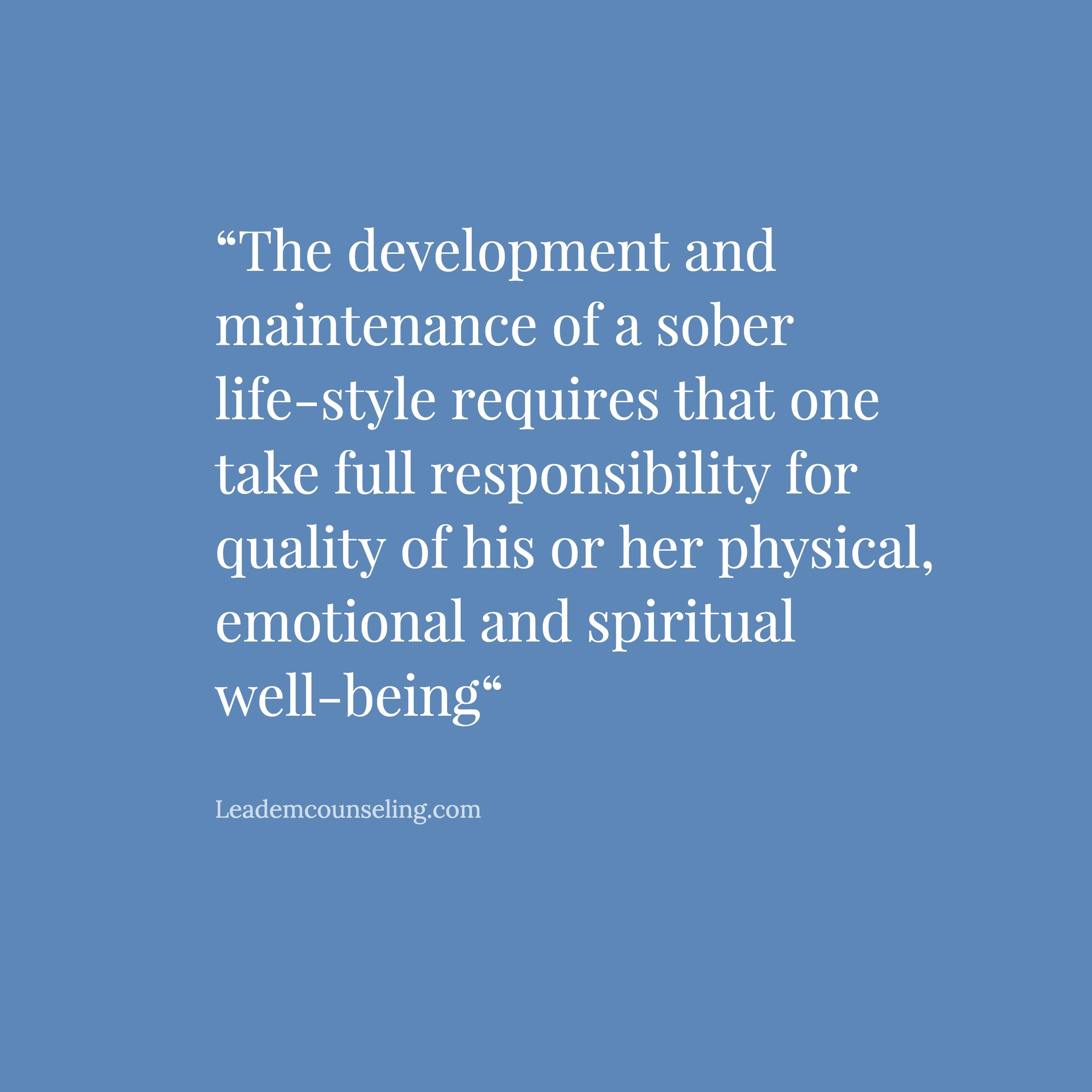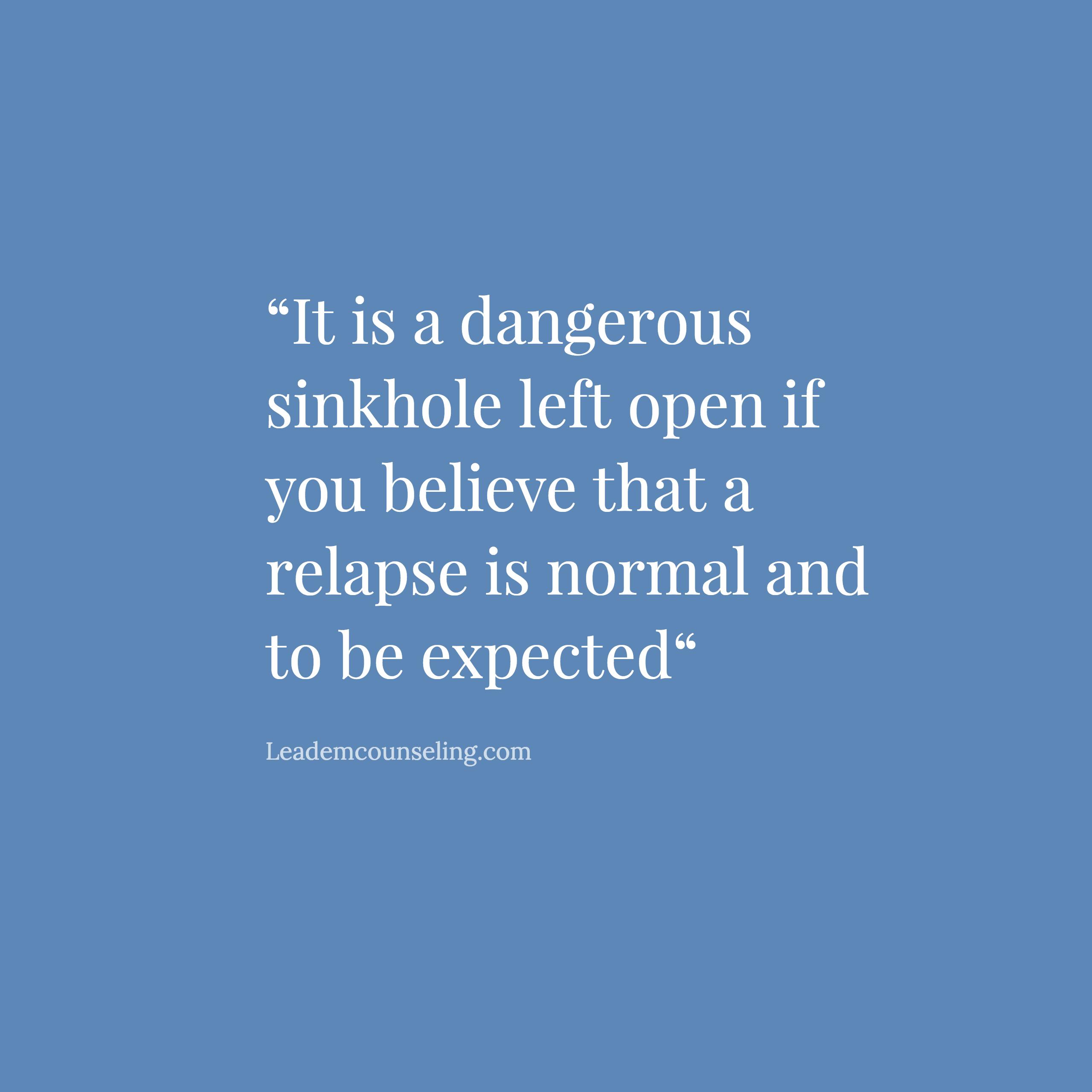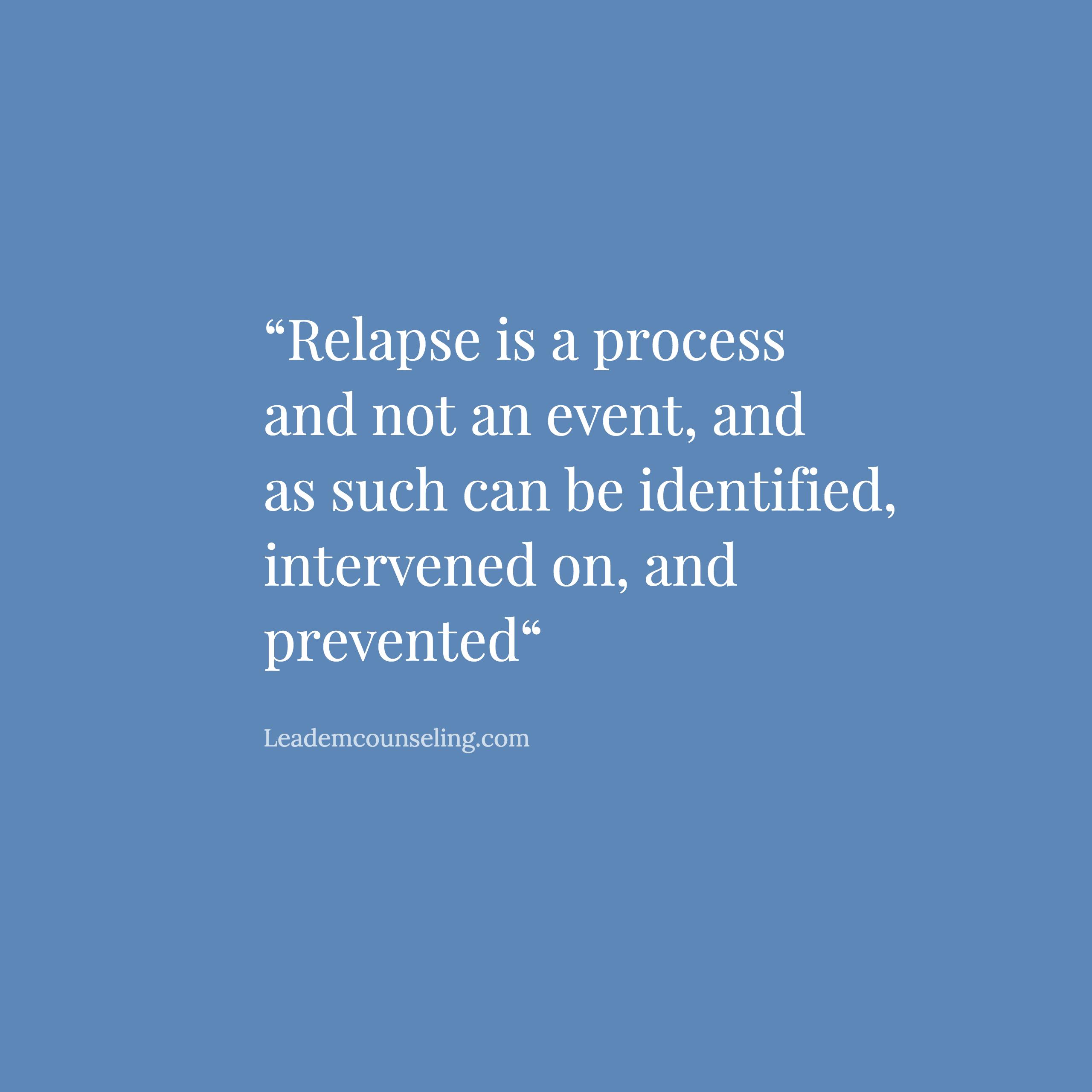How to Avoid Relapse
Relapse can be identified, intervened on, and prevented
 A plan for avoiding relapse must begin with a definition of abstinence. Abstinence is a self-enforced restraint from indulging in bodily activities that are widely experienced as giving pleasure. Because the regimen is intended to be a conscious act, freely chosen to enhance life or in the case of drug addiction to preserve life it, should be assumed that abstinence refers to doing without the object of one’s pleasurable desire. We have found that abstinence should not be confused with moderation, and recovery from addiction can not be measured without first establishing abstinence.
A plan for avoiding relapse must begin with a definition of abstinence. Abstinence is a self-enforced restraint from indulging in bodily activities that are widely experienced as giving pleasure. Because the regimen is intended to be a conscious act, freely chosen to enhance life or in the case of drug addiction to preserve life it, should be assumed that abstinence refers to doing without the object of one’s pleasurable desire. We have found that abstinence should not be confused with moderation, and recovery from addiction can not be measured without first establishing abstinence.
Recovery from addiction involves a journey that requires sacrifice and “staying the course and achieving abstinence in substance abuse treatment are two strong indicators that a patient is on the way to stable recovery.”[1]
We believe that there are no absolutes when developing relapse prevention strategies other than the finding that an addicted person cannot work on a relapse prevention plan while engaged in active addiction. Please excuse us if our position appears to be a restatement of the obvious or a lapse into cynicism. We have worked with many addicts who are struggling desperately to regain control of their lives and correct the unmanageability they are experiencing while attempting to moderate the use of their drug of choice. Experience tells us that it is impossible for an addict to establish and maintain a life of emotional and spiritual health while continuing to engage in the problem. Let us stop for a moment and explain what we mean.
Do I Have an Addiction?
 A simple, yet diagnostically significant premise to examine when attempting to determine that a person could be suffering with an addictive disorder can be found in the following recovery axiom: If the solution to a problem or challenge causes problems and you return to that “solution” after being made aware of the problems it is causing, then you could be suffering with an addiction. When a person is trying to address or remediate the consequences of addiction while trying to maintain control over his or her use of an addictive substance or engagement in an addictive process, they are not likely to enjoy sustained freedom from the consequences. Addicts can and must learn to deal with life without continuing to use an addictive “solution” that only causes more problems.
A simple, yet diagnostically significant premise to examine when attempting to determine that a person could be suffering with an addictive disorder can be found in the following recovery axiom: If the solution to a problem or challenge causes problems and you return to that “solution” after being made aware of the problems it is causing, then you could be suffering with an addiction. When a person is trying to address or remediate the consequences of addiction while trying to maintain control over his or her use of an addictive substance or engagement in an addictive process, they are not likely to enjoy sustained freedom from the consequences. Addicts can and must learn to deal with life without continuing to use an addictive “solution” that only causes more problems.
Most people, in pursuit of emotional health, can benefit from a decision to take responsibility for the quality of his or her own lives regardless of whether or not one is suffering with an addiction. In the case of addicts, however, the development and maintenance of a sober life-style requires that one take full responsibility for quality of his or her physical, emotional and spiritual well-being. Our relapse prevention course can aide an addict in his or her efforts to regain or sustain emotional stability in life whether they are new to the recovery process or have been spiraling out of control in addictive relapse cycles. Our course, An Ounce of Prevention: A Course in Relapse Prevention, is based on the premise that relapse is a process and not an event and as such can be identified, intervened on and prevented. And most importantly, relapse recovery or prevention can not begin without abstinence.
How We Define and Utilize the Term “Abstinence”
The term abstinence is used in our course to refer to the act of denying yourself of your drug of choice in whatever form it comes. When your drug of choice is a substance such as alcohol, it is relatively easy to monitor abstinence when compared to the challenge of defining or monitoring abstinence when your addiction is rooted in a process such as gambling, the pursuit of love, or overeating, to name just a few.
If you are an alcoholic, abstinence is fairly easy to interpret – you are either drinking or not drinking and there is little confusion or gray areas to cloud the picture. However, even alcoholics have become unclear about their abstinence and have found themselves lost in the fog when they have failed to responsibly monitor drinks or foods that they ingest. Some will get into trouble and trigger a relapse as a result of using cough remedies that have high concentrations of alcohol in them that they were unaware of. Others will drink “non-alcoholic” beer claiming that they don’t need to worry about the small percentage of alcohol in the beverage because the label reads “non-alcoholic beer.” This is not confusion – this is DENIAL. “Non-alcoholic beer” that contains alcohol is for NON ALCOHOLICS.
Your definition of abstinence may need to include a decision to refrain from other potentially addictive substances or behaviors in order for relapse prevention strategies to be productive for you. If you are unsure about how you should be defining abstinence for yourself talk to members of your Twelve Step fellowship, a knowledgeable addictions therapist, and/or members of your family. If you get confused about the potentially contradicting definitions available from one Twelve Step organization to the next, or simply want an additional opinion, feel free to contact us through our website.
Abstinence and Recovery
 In time, every addict will come to the understanding that “ … stopping was the easiest part of the recovery process”. If you or you addicted loved on have not been introduced to the concept of the disease model for explaining addiction, it might be new information for you that we suffer with a disease of the body, mind, and spirit: “Abstinence begins to address some of the physical aspects of recovery but the emotional and spiritual healing that is required for long-term sobriety does not flow directly from abstinence. Seasoned recovery members are quick to note that while they might have “come for their drinking” they ended up “staying for their thinking.” And so it is with most of us. We come to recovery wanting to quell the storm of active addiction and discover that we are emotionally and spiritually ill and that we will need to address the emotional and spiritual aspects of our disease if we are to keep our disease in an arrested state. Do not be too alarmed if the honeymoon of early recovery has begun to fade. You are discovering that the easy part of the recovery process is establishing abstinence and the challenging parts of recovery are found in the lessons you will learn about getting comfortable in your own skin. Our course will help you do that without having to relapse first – because it is not required.
In time, every addict will come to the understanding that “ … stopping was the easiest part of the recovery process”. If you or you addicted loved on have not been introduced to the concept of the disease model for explaining addiction, it might be new information for you that we suffer with a disease of the body, mind, and spirit: “Abstinence begins to address some of the physical aspects of recovery but the emotional and spiritual healing that is required for long-term sobriety does not flow directly from abstinence. Seasoned recovery members are quick to note that while they might have “come for their drinking” they ended up “staying for their thinking.” And so it is with most of us. We come to recovery wanting to quell the storm of active addiction and discover that we are emotionally and spiritually ill and that we will need to address the emotional and spiritual aspects of our disease if we are to keep our disease in an arrested state. Do not be too alarmed if the honeymoon of early recovery has begun to fade. You are discovering that the easy part of the recovery process is establishing abstinence and the challenging parts of recovery are found in the lessons you will learn about getting comfortable in your own skin. Our course will help you do that without having to relapse first – because it is not required.
You will hear many times during our course that relapse is not a part of the recovery process because it is a dangerous sinkhole left open if you believe that a relapse is normal and to be expected. You will see members of your group, whom you have come to admire, relapsing and you could become confused. You will witness some people return from a relapse with seemingly little in the way of consequences for their decision to return to their drug of choice. Do not consider that the hardship others face with relapse means that it is normal because you might encounter a pattern of people relapsing during your initial introduction to recovery. Likewise, avoid assuming that those who relapse without apparent problems are free of consequences. It is more likely that you are comparing your insides to someone else’s outside appearance. As you get to know people who have relapsed you will learn it never gets better in active addiction” (Leadem & Leadem, 2009).
Abstinence and stabilization is critical to the development of strategies for recovering from and avoiding relapse. The following highlights of the Tasks associated with our recommended plan for establishing stabilization can be helpful in developing a plan for relapse prevention.
A Relapse Prevention Technique
 The following excerpt and task highlights are taken from a lesson from the beginning of our course:
The following excerpt and task highlights are taken from a lesson from the beginning of our course:
Returning from a relapse can be quite challenging and potential weaknesses in your previous or current recovery plan could give rise to another relapse before you can fully understand what has just happened and get back on your feet. It is common to hear suggestions that you should treat relapse like a fall from a horse and get right back in the “saddle.” A quick return to the support and acceptance available in the Twelve Step rooms is certainly advisable as are efforts to reconnect to trusted members of your support group. It is not, however, a good idea to return blindly to the strategies for maintaining sobriety that you had been relying on in the past because something was wrong if you relapsed.
The following tasks are especially important if you are returning from relapse after a period of sobriety as they are intended to create and/or fortify your foundation. In Course Assignment 2.1 you will be asked to formalize a preliminary recovery plan. The items to be addressed in the plan are listed below for your review:
- Describe any health problems that resulted from your relapse or may have occurred during your relapse process and how you plan to address them:
- Describe your plan for completing the first three steps of the Twelve Step program as quickly as possible. If you have already completed Steps One through Three describe what you learned about yourself, your relapse, and/ or how the insights gained may help you to prevent a relapse in the future:
- How do you plan to make regular attendance at Twelve Step oriented recovery meetings your number one priority:
- What steps will you take to develop or enhance the breadth and depth of your support system or make better use of the support you currently have:
- List the threats to your personal or recovery safety and describe your plan for remaining safe:
- List the behaviors you display or the perception that others have of you that has generated the concern about your potential for dangerousness to yourself or others and what you plan to do or have done about them:
- List any threats to your sobriety that are related to your economic health and how you plan to address these problems:
- List the meetings or people to whom you need to disclose your relapse:
- Take a quick inventory of the degree to which your relapse may have threatened your job security and what steps you will take to address these problems:
- List any legal problems that developed during, or as a result of, your relapse and how you plan to address these problems
A more detailed explanation of each of the ten tasks is outside the scope of this article but available for you in our publication available through our online store.
It will be important to complete these stabilization tasks in collaboration with those who care about you or who are helping you to care for yourself. It is commonly understood in a seasoned recovery community that “I get drunk … and We get sober”. You don’t have to do it yourself and allowing others to help you recover from addiction or prevent the next relapse will help those that care for you in ways that you might not yet imagine.
Relapse is a Process and Not an Event
 Many ill-advised plans for preventing addiction or relapse such as former first lady, Nancy Reagan’s, Just Say No campaign.[2] have failed to have an impact largely because they are based on a model that lacks the scope of understanding of addiction needed to frame meaningful strategies for prevention. Unfortunately, the shallow understanding of the problem continues with President Trump’s suggestion that : “ … that the way to avoid opioid addiction is never to start in the first place: “If they don’t start, they won’t have a problem”[3].
Many ill-advised plans for preventing addiction or relapse such as former first lady, Nancy Reagan’s, Just Say No campaign.[2] have failed to have an impact largely because they are based on a model that lacks the scope of understanding of addiction needed to frame meaningful strategies for prevention. Unfortunately, the shallow understanding of the problem continues with President Trump’s suggestion that : “ … that the way to avoid opioid addiction is never to start in the first place: “If they don’t start, they won’t have a problem”[3].
We believe that anyone can develop the insights necessary to make a difference if they understand that relapse is a process and not an event, and as such can be identified, intervened on, and prevented.
See our book: An Ounce of Prevention: A Course in Relapse Prevention
Related Article(s): Our Model of Relapse Prevention and a Personal Account of Recovery
What is Relapse? What is Relapse Prevention?
How Can Family Help Intervene in Addiction? The Importance of the Intervention Team?
What is Intervention? Practical Uses for Intervention Strategies
About the Authors
 Both John and Shawn Leadem are Licensed Clinical Social Workers in private practice in Toms River, New Jersey.
Both John and Shawn Leadem are Licensed Clinical Social Workers in private practice in Toms River, New Jersey.
John has recently celebrated his 45th year in recovery and believes that “service to others is the cornerstone of spiritual maturity.” His professional service to addicted individuals and their families has included the development and direction of addiction treatment services in a full array of modalities from half-way houses to large residential treatment facilities over the past 44 years.
Shawn’s lifelong exposure to the recovery culture and his personal recovery experience has left him with a deep personal empathy for the social and emotional suffering endured by others and a strong faith in a person’s ability to change. He has received his certification as a Sexual Addiction Therapist and as a Multiple Addictions Therapist by the International Institute for Trauma & Addiction Professionals.
Together, John and Shawn have co-authored and brought their unique treatment model of relapse prevention, An Ounce of Prevention: A Course in Relapse Prevention, to residential treatment centers across the United States, they have trained therapists at numerous national and international conferences, and most recently have trained many EAP programs associated with many State Unions.
Copyright, John Leadem & Shawn Leadem, 2017
You are free to copy this article for future reference, to post it on other web sites and to share it with family or friends. If you would like to have permission to include it in a publication of your own you can request written permission by contacting the authors at www.leademcounseling.com.
[1] Abuse, National Institute on Drug. “Incentives Promote Abstinence.” NIDA, 1 Dec. 2010, www.drugabuse.gov/news-events/nida-notes/2010/12/incentives-promote-abstinence.
[2] “The Disastrous Legacy Of Nancy Reagan’s ‘Just Say No’ Campaign.” ThinkProgress, thinkprogress.org/the-disastrous-legacy-of-nancy-reagans-just-say-no-campaign-fd24570bf109/.
[3] Merica, Dan. “Trump Says Don’t Start Opioids, but Often They Are Prescribed.” CNN, Cable News Network, 8 Aug. 2017, www.cnn.com/2017/08/08/politics/trump-opioid-addiction-advice-prescription/index.html.
[apss-share networks="facebook, twitter, google-plus, pinterest, linkedin" counter="0" total_counter="0" http_count="1"]







2 Comments | Post Comment
John & Shawn
Enjoyed your post on issues of relapse to substance and process addictions immensely. I have met more than a few who might benefit from your post about recovery and relapse here on LinkedIn, including many who undoubtedly would benefit from your publications and retreats.
Thank you for your precious work.
Be well and gentle with each of your own and other’s souls.
Larry,
Thank you for your very touching comment. It is so good to hear from you. I am so grateful for the inspiration that you offer to addicts and their families. I pray you are filled with peace and joy.
John
Leave a comment